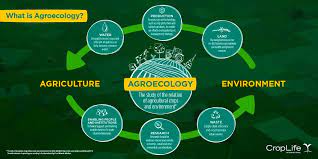Agroecology represents a holistic approach to agriculture that emphasizes the integration of ecological principles, biodiversity conservation, and sustainable management practices. In this comprehensive analysis, we delve into the synergies between agroecology and ecosystem services, unraveling the intricate connections that underpin sustainable food production, environmental resilience, and human well-being. Watch Agricultural YouTube Shorts on my channel
Understanding Agroecology
Agroecology is a dynamic field that seeks to optimize agricultural systems by leveraging natural processes, biodiversity, and traditional knowledge to enhance productivity, resilience, and ecosystem health. At its core, agroecology embraces the following principles:
1. Biodiversity Conservation
Polycultures:
Diverse cropping systems, polycultures, and intercropping techniques promote biodiversity, enhance soil fertility, and suppress pests and diseases through natural ecological interactions.
Agroforestry:
Integrating trees, shrubs, and perennial crops into agricultural landscapes enhances ecosystem services, such as carbon sequestration, soil conservation, and water retention, while providing additional sources of income and food security for farmers. YouTube Shorts on Harvesting.
2. Soil Health and Fertility
Soil Conservation:
Conservation tillage, cover cropping, and crop rotation practices improve soil structure, reduce erosion, and enhance nutrient cycling, fostering long-term soil health and productivity.
Natural Inputs:
Utilizing organic amendments, green manures, and composting methods enrich soil organic matter, increase nutrient availability, and reduce reliance on synthetic fertilizers and agrochemicals.
3. Community Participation and Knowledge Sharing
Participatory Approaches:
Engaging farmers, communities, and stakeholders in participatory research, experiential learning, and knowledge exchange fosters adaptive management, innovation, and social cohesion in agroecological systems.
Traditional Wisdom:
Incorporating indigenous knowledge, local practices, and traditional agroecological techniques enriches agroecosystem resilience, cultural heritage, and socio-ecological sustainability.
Ecosystem Services and Agroecology
Ecosystem services are the benefits that ecosystems provide to humans and other organisms, encompassing provisioning, regulating, supporting, and cultural services. Agroecology enhances and relies on ecosystem services in the following ways:
1. Provisioning Services
Food Production:
Agroecological practices contribute to sustainable food production by diversifying cropping systems, improving crop yields, and enhancing nutritional quality, resilience, and food security for local communities.
Livestock Grazing:
Managed grazing systems, rotational grazing, and silvopastoral agroforestry systems optimize forage production, soil fertility, and animal health while reducing environmental impacts associated with intensive livestock production. Best YouTube Shorts on harvesting.
2. Regulating Services
Water Management:
Agroecological approaches to water management, such as rainwater harvesting, soil conservation measures, and agroforestry buffers, mitigate soil erosion, minimize runoff, and enhance water infiltration and retention in agricultural landscapes.
Climate Regulation:
Agroecosystems play a crucial role in climate regulation by sequestering carbon dioxide, mitigating greenhouse gas emissions, and enhancing ecosystem resilience to climate variability and extreme weather events.
3. Supporting Services
Pollination and Pest Control:
Agroecological practices that enhance biodiversity, habitat diversity, and ecological balance promote natural pest control, pollination services, and biological diversity, reducing reliance on synthetic pesticides and insecticides.
Soil Formation and Nutrient Cycling:
Agroecology fosters soil formation, nutrient cycling, and organic matter accumulation through biological processes, mycorrhizal associations, and microbial activity, maintaining soil fertility and productivity over time.
4. Cultural Services
Traditional Knowledge Systems:
Agroecological systems preserve and transmit traditional knowledge, cultural practices, and indigenous wisdom related to agriculture, biodiversity conservation, and sustainable resource management.
Sense of Place:
Agroecological landscapes provide aesthetic, spiritual, and recreational values, connecting people to nature, fostering a sense of place, and promoting cultural identity and community well-being.
Challenges and Opportunities
While agroecology offers promising solutions to global food and environmental challenges, it also faces significant barriers and constraints:
1. Knowledge and Capacity Building
Education and Extension:
Enhancing agroecological literacy, training, and capacity-building programs for farmers, researchers, and extension agents facilitates the adoption and scaling of agroecological practices and principles.
Research and Innovation:
Investing in participatory research, interdisciplinary collaborations, and farmer-led experimentation generates evidence-based knowledge, innovations, and best practices in agroecology.
2. Policy and Institutional Support
Policy Integration:
Mainstreaming agroecology into agricultural policies, land-use planning, and natural resource management frameworks fosters supportive policy environments, regulatory incentives, and financial mechanisms for agroecological transitions.
Market Access and Incentives:
Creating markets, value chains, and certification schemes that recognize and reward agroecological products incentivizes farmers to adopt sustainable practices and meet consumer demand for ethically produced foods.
Conclusion: Cultivating Synergy, Nurturing Resilience
Agroecology represents a paradigm shift in agricultural thinking, emphasizing the interconnectedness of human activities, ecological processes, and socio-economic dynamics. By harnessing the principles of agroecology and leveraging ecosystem services, we can cultivate sustainable, resilient food systems that nourish people, protect the planet, and promote prosperity for generations to come. As we sow the seeds of harmony and sustainability in our agricultural landscapes, let us cultivate a future where agroecology flourishes as a cornerstone of food sovereignty, environmental stewardship, and social justice.
Top of Form

